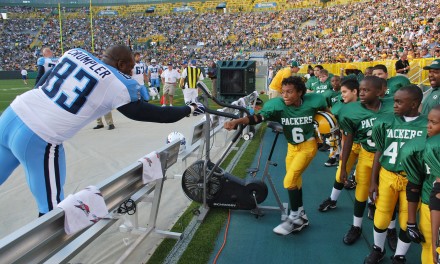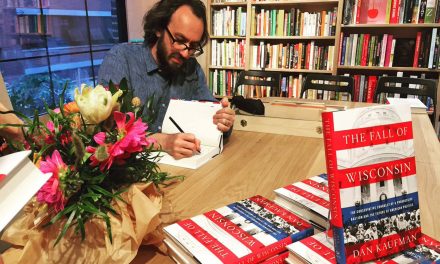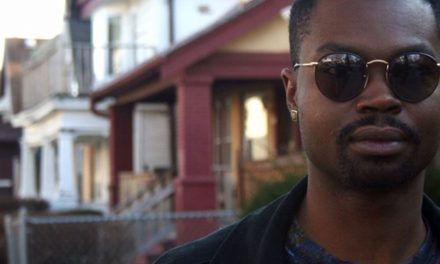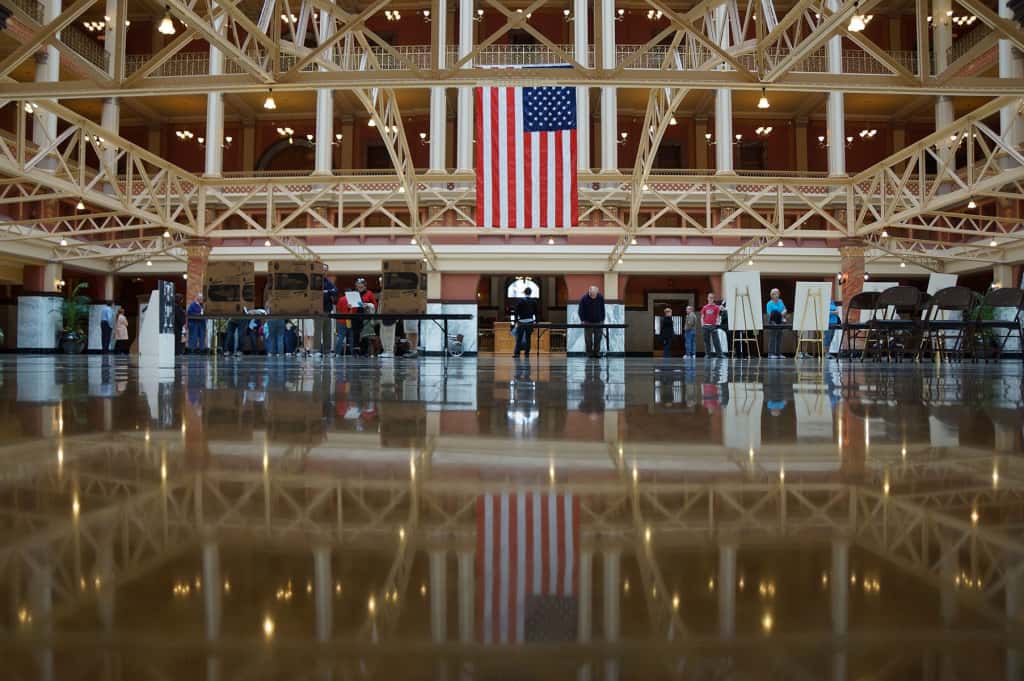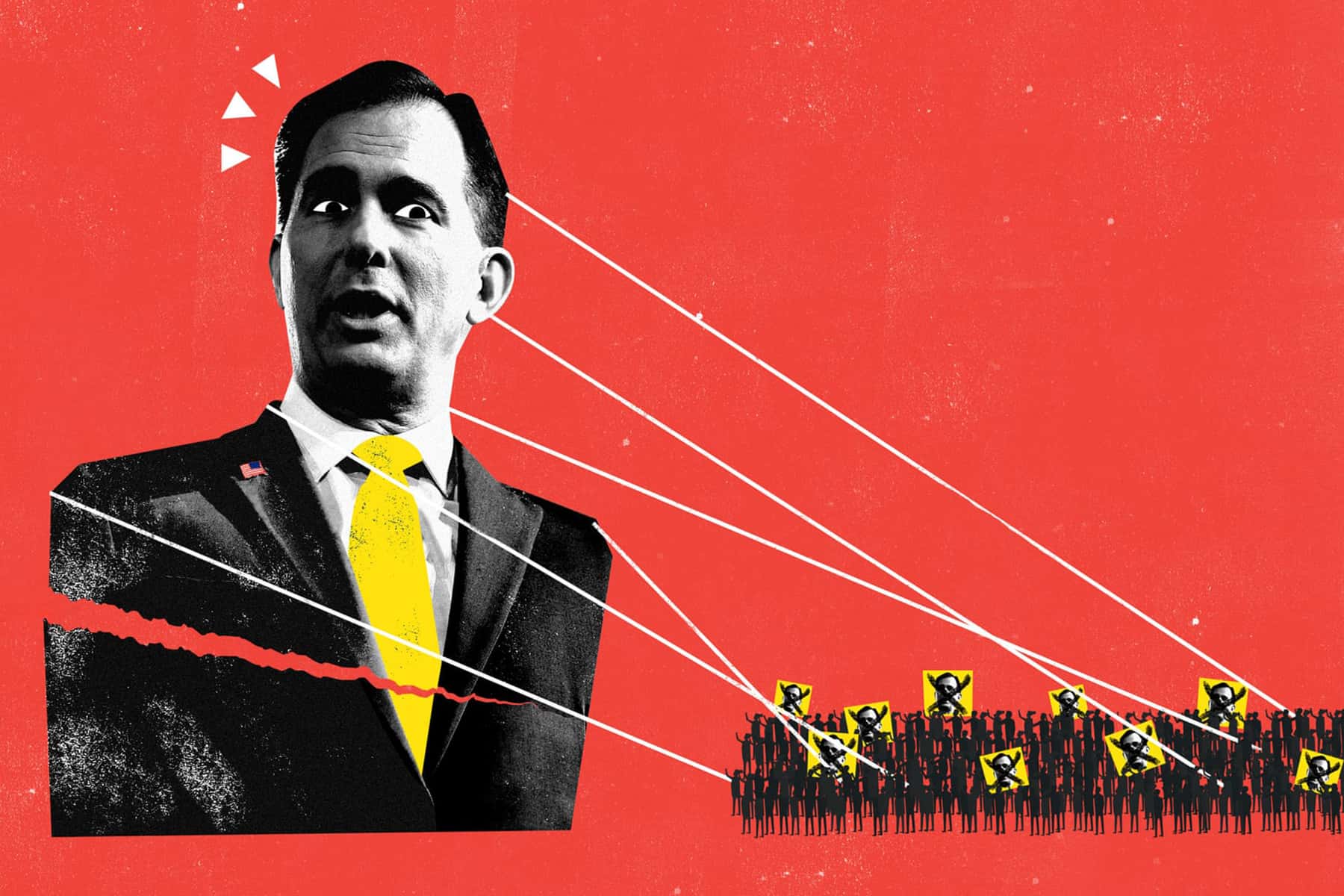
Governor Scott Walker has undone Wisconsin’s progressive past and turned it into a lab for rightwing governance, but millennials have a different vision for the future.
Outside the Chazen Art Museum on the campus of the University of Wisconsin–Madison, a shark, a banana, and Nada Elmikashfi are trying to corral students to the polls for the first day of voting.
Madison, the liberal heart and state capital of Wisconsin, is in the final stages of a tight race to decide the political future of this once progressive state that is now deeply conservative, at least in terms of policy.
Like many of the young voters on campus, Elmikashfi, a fellow with NextGen America, a liberal political advocacy group, is determined to reverse the state’s decade-long lurch to the right. Beneath a cornflower blue sky Elmikashfi and two friends in fancy dress are handing out leaflets explaining why this midterm vote is so important. And why is it so vital to her?
“I’m a black Muslim woman and an immigrant,” Elmikashfi said. “I am trying to reclaim my voice.”
Wisconsin is in many ways emblematic of the deep divide roiling American politics. Since 2010 its union-busting governor, Scott Walker, has pursued small government, pro big-business policies that have undone Wisconsin’s progressive past and turned it into a laboratory for conservative governance. His policies have become a test bed for the Koch brothers and other rightwing billionaires – a model for their larger vision of America trotted out for others to copy at rightwing think-tanks across the country.
Walker, according to tax-hating political advocate Grover Norquist, has been more influential in defeating the progressive agenda than Trump. If his policies are “enacted in a dozen more states, the modern Democratic party will cease to be a competitive power in American politics. It’s that big a deal,” he wrote last year.
The governor seems to have been born hard right. At elementary school Walker started a “Jesus USA” club and at university he told a fellow student, “God told me I am chosen to cut taxes and stop killing babies.” His popularity is low these days and he is trying to win people back with tweets about his everyman eating habits, but there’s no denying his effectiveness.
Walker’s supporters won a major victory in 2016 when Donald Trump won the state, the first time Wisconsin had elected a Republican president since Ronald Reagan in 1984. Walker has worked tirelessly to disenfranchise voters and gerrymander Wisconsin into a shape that makes it easier for Republicans to win. If elected to a third term he could ensure the party’s dominance for a generation.
Hillary Clinton hardly bothered to campaign in Wisconsin in 2016. This time the fight to stop Walker’s vision of the future has attracted top-tier talent. Barack Obama, Bernie Sanders, Joe Biden and rising stars like Kamala Harris have all been out supporting Walker’s opponent – Tony Evers, the state’s superintendent of education.
A nerdy 66-year-old, Evers is the anti-Walker. He has spent his life in education and often sports a black T-shirt that says, “I [heart symbol] My Public School.” His policies are about spending more on schools and roads – undoing Walker’s legacy of cuts, cuts, cuts.
But that legacy could potentially be Walker’s undoing. For millennial students, many voting for the first time, their first taste of politics was during the wave of strikes and protests that came after Walker rammed through Act 10 – legislation that stripped public school teachers of their right to collective bargaining and forced educators to contribute far more to their health insurance and pensions.
The millennials were out in force in the Capitol Ballroom of the Madison Concourse Hotel last weekend at a rally for the Democratic senator Tammy Baldwin, currently running comfortably out in front for re-election against Leah Vukmir, a Wisconsin senator with close ties to the American Legislative Exchange Council (ALEC).
“I’ve grown up with Scott Walker and seen how things have gotten worse,” said Sigal Felber, a student at the University of Wisconsin. “School funding, potholes, concealed-carry signs. He’s not for the people, he’s for the Republicans.”
Felber is 20 and has voted in every election she has been qualified to vote in. It is not typical of young voters, who often tend to miss the polls, but she says she thinks that is changing.
Her friend and fellow student Laura Livermore, 19, agreed. She has voted in previous primaries and even for supreme court justices. “I think people are tired of this. We want change,” she said.
The hollowing out of the unions and Walker’s spending cuts have fundamentally changed Wisconsin. It is a historic shift documented in Dan Kaufman’s new book The Fall of Wisconsin: The Conservative Conquest of a Progressive Bastion and the Future of American Politics.
Under Walker, Wisconsin has witnessed one of the largest declines in its middle class of any state. Its poverty rate is at a 30-year high and its roads are the second worst in the union, locals refer to “Scottholes.”
Kaufman argues that Walker’s success in beating the unions effectively paved the way for Trump, hitting the pockets of the unions, the only group powerful enough to take on the massive amounts of corporate, rightwing money now pouring into races across the country. “There’s a lot of interest in the book across the midwest,” Kaufman said. “A lot of things that have happened there are happening here.” In regions that handed the presidency to Trump.
The polling suggests Walker is in the fight of his life. Evers currently has a slight lead, according to Real Clear Politics, but it’s too close to call, and writing off a campaigner as skilled as Walker would be a mistake.
Millennials are now equal baby boomers as a voting bloc vote in lower numbers – just 46% of them voted in 2016, compared with 69% of boomers. Early voter turnout, at least in Madison, seems to be ahead of 2016. But Wisconsin’s older voters seem just as fired up as millennials.
In Oak Creek near Milwaukee, Republican Bryan Steil is running for the seat being vacated by the House speaker, Paul Ryan, in a vicious and closely fought race with the ironworker and rising Democratic star Randy Bryce. The candidates’ attitudes towards Israel was the top priority for Vernon Engstrom, a 51-year-old automotive worker who supports Steil. He does not like Trump’s style but supports his policies.
“I am a Christian and he’s supportive of Christians. Trump does seem to be doing what he said he’d do,” explained Engstrom.
Another supporter who would only give her first name, Carol, and age, 68, hissed with anger at the “mess” she said Barack Obama had left.
“We have suffered eight years of the worst policies. The economy was so bad. It was all such a mess,” she said, before submitting a question to the candidates about their attitudes to later-term abortions.
Tommy Thompson, former Republican governor of Wisconsin, said the state had always been politically divided. What has changed is the viciousness of the debate. Thompson, the longest-serving governor in the state’s history, is currently appearing in ads for Walker. Tellingly, Walker’s ads often use surrogates, he clearly knows how many people feel about him. Locals say it’s the first time Thompson has done ads for Walker but Thompson said “he can’t remember.”
“He should have used me before, I am very popular,” said Thompson.
It is certainly one of the most gentle ads bombarding Wisconsinites, none of the accusations of “plagiarism” or attacks from family members that feature in other ads. What disappoints Thompson about the current race is just how angry the state has become.
“I think people have had enough. The pushing and shoving, the shouting – from both sides. This is not America. After the race is over, I hop people will come together,” added Thompson. “It’s time for us to set our anger aside.”
Dominic Rushe
Nate Kitch
Originally published on The Guardian as Can young people take back Wisconsin from Scott Walker’s hard-right grip?
Help deliver the independent journalism that the world needs, make a contribution of support to The Guardian.

